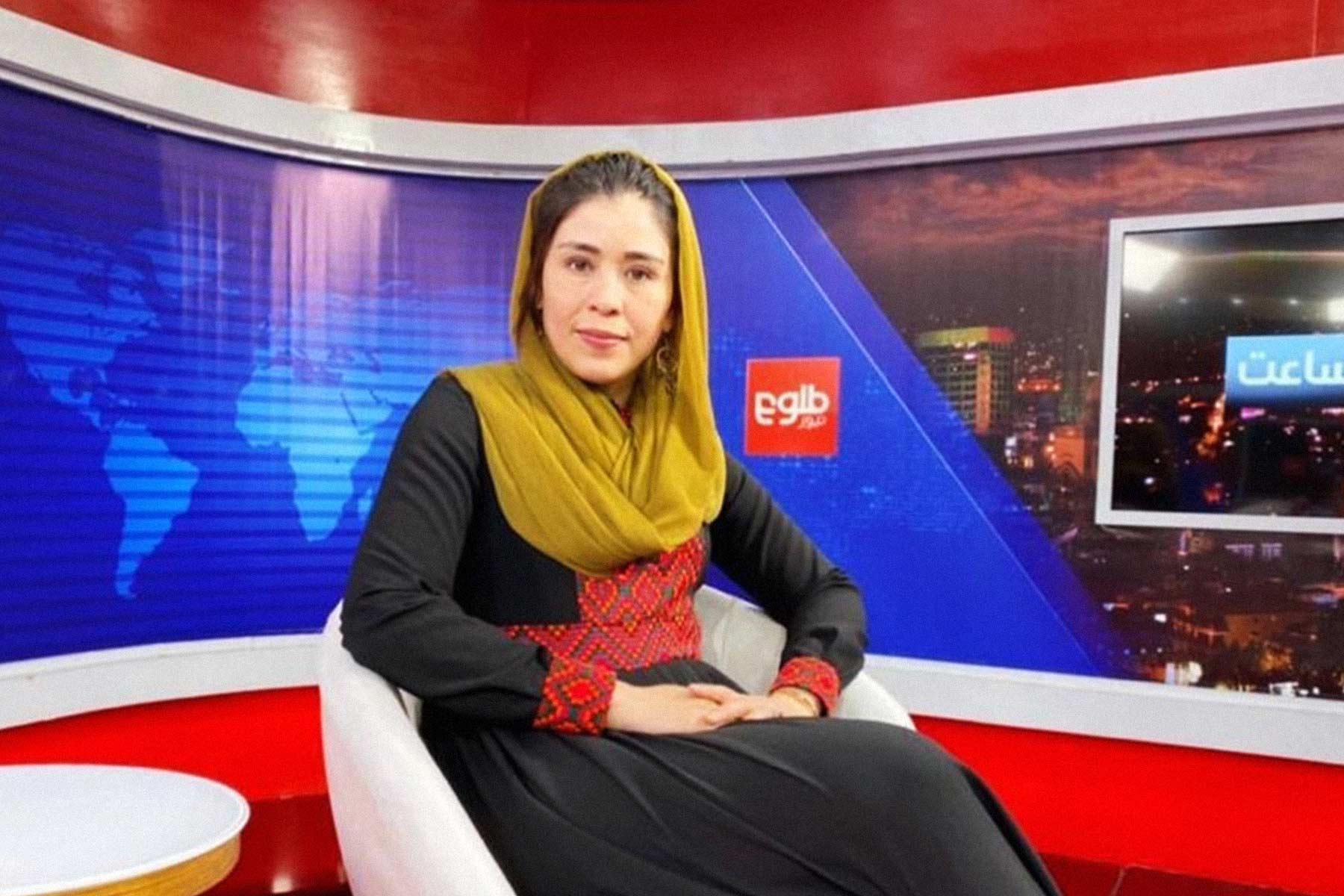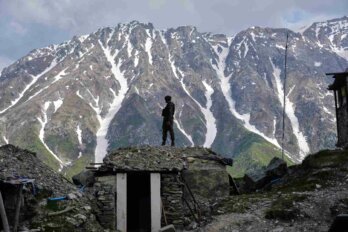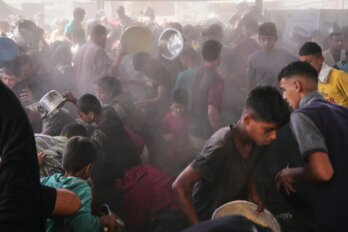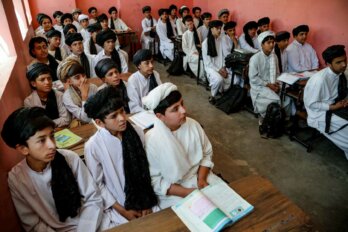At 8:30 one August morning two years ago, I was at home in the Pul-e Surkh area of Kabul when my sister called. She worked for Doctors Without Borders in Afghanistan, and she’d been told to stay home that day. She wanted to warn me about what she’d heard: the Taliban, who had been taking back power in the provinces for months as US troops were beginning to withdraw from Afghanistan, were coming for Kabul.
I didn’t want to sound scared, so I told her not to worry. Based on what I’d learned while covering the peace negotiations between the US, the Afghan government, and the Taliban the previous year, the Taliban’s takeover of Kabul was expected to take at least six months. “We have time,” I said to my sister. I even tried to joke with her. She told me to be serious.
As soon as we hung up, I knew I had to get to work. I found a taxi and told the driver to take the shortest route to the office. When we were about halfway there, my mother called. She also tried to warn me about the Taliban’s return, but I didn’t want to talk about it until I could find out the facts. “Okay,” I said to my mother in English before hanging up. “Bye.”
I remember the driver, who was an older man, turning to face me and asking, “Why are you using English words?” If the Taliban returned to power, the driver said, they would target people like me—people who spoke English, didn’t cover their faces, and dressed in Western clothes. He told me to get out of the car. “You’re dangerous,” he said to me.
It usually cost 300 afghanis, or about $4.75, to get from my apartment to the office. I offered the driver 1,000 afghanis for the trip just so I could stay in the car. I didn’t want to be on the streets on my own. If the Taliban returned to power, they would be coming after me. As a Hazara minority and a female journalist, I was one of their prime targets.
Ihad the most amazing job in Afghanistan. I’d been a producer for TOLOnews, the country’s largest and first twenty-four-hour news and current affairs TV channel, for five years. I was part of a large team that generated over thirty news stories and sixteen hours of live content every day. We interviewed almost 3,000 people from across the country each month, giving many Afghans the chance to express their opinions publicly—often for the first time. I was in charge of several programs, including the 6 p.m. national newscast. I produced town halls, election debates, and special interviews with then president Ashraf Ghani and Abdullah Abdullah, a government chief executive and three-time presidential candidate, among other major personalities. The presence of female journalists had grown in the post-Taliban era, but it still wasn’t easy to be a woman in the industry.
My friends and colleagues would tease me saying if they couldn’t find me at home, they’d find me in the news studio. I was one of the first women to work the night shift and would often get home at midnight, but no matter how tired I was, I was always happy to see the results of my work. It made me feel like a useful person in society. One of my duties was to invite guests to some of our news shows, so I was regularly in touch with government officials and personnel, professors, women and youth, and even Taliban representatives. I once reached the storage limit of 3,000 contacts on my phone. In my time at TOLOnews, I was especially pleased with the part we played in covering COVID-19. At first, many Afghans believed the pandemic to be a hoax. We created segments that informed viewers about the virus and how to stay safe from it.
The job had its share of difficulties, some of which haunt me even today. I can’t recall a single day when our headlines and subtitles, which I helped write, did not refer to war. A day without explosions was notable if it ever happened. There were attacks on hospitals, schools, and other public spaces. Government representatives and our reporters would phone me each time to update the death toll. My hands trembled whenever I had to enter the new figure, remembering that each number represented lives lost. I struggle with citing numbers and statistics. In my five years of working as a producer, I lost five of my colleagues. It has been hard to process. We were like family.
My actual family lived in Kabul’s Dasht-e-Barchi neighbourhood, which is predominantly Hazara. I rented an apartment close to the TOLOnews headquarters and the downtown area because it often took too long to get home after work—sometimes up to three hours, depending on the traffic. The apartment was also close to Avicenna University, where I was completing my master’s degree in international relations at the same time.
The area was much safer than Dasht-e-Barchi, which the Taliban and Daesh, or ISIS, often bombed. Yet I never felt safe moving between the office, the university, and my parents’ house. I hardly ever felt secure anywhere. At the university, I remember people would occasionally stand guard with rifles by the doors in case we were attacked. But when I was at the office, I felt like I had the power to do something about the violence. I could at least report on it.
August 15, 2021, the day the taxi driver ordered me out of his car, would be known as the day Kabul fell. The Taliban took over the capital. President Ashraf Ghani fled the country. But in that moment, standing on the sidewalk on my own, I didn’t know yet what was about to happen. Around me, people were rushing in all directions, and I had to decide whether to go back home or continue on to work.
I called the studio. My colleagues told me to go home. It was too risky to be in the office, especially for the women, they said. I went to a friend’s house and waited.
Around 4:30 that afternoon, a Taliban leader, whom I had previously invited for one of our news programs, called me on WhatsApp. I didn’t pick up. Later, he sent me a voice message: Soraya, we have arrived in Kabul, he said. He wanted me to produce a special program for him to appear on. It was then that it started to sink in that we were going to lose the media freedom we had enjoyed for so long. Not even my boss had ever told me whom to invite to the program. Then the Taliban leader sent me another voice message, in a more serious tone. I passed the voice message along to my boss. “We have no other choice,” he said to me. “You’ll have to invite the Talib official.” I did, but it wasn’t my choice. Some of the Taliban brought their guns to the interviews.
From my friend’s house the next night, I created a WhatsApp group called “TOLOnews—Ladies” and added all my female co-workers, including those who worked in the makeup area, as well as our manager, who was a man. We shared our concerns with our boss. You’re not the only one at war with the Taliban, we said. We are too. Our manager continued to tell us not to come to work.
I couldn’t stand remaining confined. After three days, I took a taxi to the office without permission. As I stepped out of the car, I looked at the building and couldn’t imagine ever seeing it again as a place that contained my office and colleagues. I went to the cabinet where I kept some of my personal items, including my identity card, my university ID, a few scarves, and some makeup. I quietly circled the rooms to soak in the place. I was afraid my supervisor would see me, so I returned to my apartment and spent the following few days working from home.
On August 22, some of my colleagues and I evacuated to Qatar on an American military flight. I left the rest of my family behind. The only thing I brought with me was my phone with all the contacts I’d collected over the past five years. It was my first time leaving the country. As we boarded the flight, I saw everyone around me crying and shaking their heads. I tried to look away and control my own tears. At that moment, I was thinking about how twenty years of democracy, freedom, and women’s rights—all of which were new to many of us—had been destroyed overnight. And I understood deeply that Afghanistan without war was just a dream.
When we landed in Qatar, I couldn’t wait to get off the plane. My throat felt like it was filled with smoke and gunpowder from the time spent at Kabul airport. I was in pain. Four days later, we flew on to Albania, and we were received with warmth and hospitality. After five months, I was given the option to go to Canada, which was accepting Afghan refugees. When I was younger, I had dreamed of going there someday. But when I accepted the offer, it didn’t feel as though I was fulfilling a dream. This wasn’t how I wanted to end up in Canada—fleeing the Taliban, alone, unprepared. And I would soon learn that getting to Canada wouldn’t automatically mean living in peace and comfort. The hard part was just beginning.
I landed in Toronto near the end of January 2022 with nine of my colleagues. At this point, we were all separated and sent to different parts of the country. Within hours, I was put on a flight by myself to Sault Ste. Marie, Ontario. I had no idea what to expect. My whole body was in pain. When I landed, two people were waiting for me, waving a banner that said “Welcome” in big red letters. They drove me to a hotel where I would be staying for a few weeks. A case worker helped me find housing and showed me some basic landmarks and shops—Food Basics and Walmart. But I couldn’t stay in the dark room in the basement apartment he had rented for me, where I shared a bathroom with three other people. I have a severe skin allergy that’s aggravated when I don’t see sunlight. When I raised this with the case worker, he reminded me that the stipend I received as a refugee was only around $1,000 per month. Finding a room to rent on that budget, with enough left to buy food and other necessities, was not going to be easy. He did find me somewhere else to live later on that was better. But I was struck by how people think that refugees will accept any living conditions because, presumably, anything is better than where they came from.
A few months later, I moved to Toronto, thinking there would be more work opportunities there. I didn’t have a case worker helping me this time, so I had to find an apartment on my own. I thought I had found the perfect rental on Facebook Marketplace and made a $300 down payment. But the person who had posed as the landlord stopped responding, and I realized I had fallen for a scam. An Afghan family I knew that had been living in Toronto for a long time let me stay with them. Every day, I tried to have my own breakfast and lunch outside of the house and joined them only for dinner. As much as they tried to help me, I fell back into depression and wondered how I would ever find my way.
In the meantime, nobody would employ me. I applied for jobs at McDonald’s and Tim Hortons, among other places. I was often told that I lacked sufficient Canadian experience. But how, I wondered, could I ever get a job if I wasn’t allowed to develop that experience. I offered to work for free for a few months at one restaurant so I could prove myself. But the owner declined. I eventually got a job through Journalists for Human Rights. Now, my work environment is like that of a university, because I’m getting to know a new work culture, and stepping out of my comfort zone is making me feel powerful. I eventually found an apartment through a friend of one of my classmates in an English course I was taking. Over time, my mental health improved. But I often worry about the future, about how to help my family in Afghanistan. Everything I’m doing here is for them too.
Whenever I feel anxious, I walk outside just to see people doing normal things—going to restaurants, going shopping—and remind myself that I’m in a safe, peaceful place. I’ve started to feel a sense of civic responsibility. When I see someone experiencing homelessness, I feel bad for them, and I wish I could do something to help. It’s the same feeling I used to have in Afghanistan when I would see the problems around me and wonder why the government didn’t do more to fix things.
Ican’t forget my past, nor do I want to. Many media outlets were shut down in the first few months after the Taliban’s return. Thousands of journalists have left the country over the past two years. Journalists who have stayed live under constant threat, both from the Taliban and Daesh, of being beaten or bombed.
The best way to protect the lives of Afghan people is to protect journalists. If we want to know what’s happening there, we need to help journalists continue their work. Otherwise, the disaster of the 1990s, when the Taliban first came to power in Afghanistan, will repeat itself. It is already starting to. There is no more school, university, or professional work for most teenage girls and women.
But in the two decades before the Taliban returned, women in Afghanistan saw a brighter world for themselves. That light can’t be switched off so easily. Even as the Taliban returned and took over the provinces, even as Kabul fell, and even though the news from Afghanistan is almost constantly devastating, I still have hope that things will get better. It’s clear to me that the Taliban’s efforts to suppress women and destroy their lives will not succeed. It is also clear to me that the Taliban fear educated and literate women. Their problem with women isn’t a question of modesty or religious observation. They seek to remove women from public life entirely. I don’t have any expectations that the Taliban will change their ways. I know their minds. Instead, support and solidarity for women have to come from the international community—one that I am now part of.
I am still in touch with some of my old colleagues and have met other Afghan journalists in North America. A former boss, who now runs Amu TV, an Afghanistan-focused TV channel in the US, recently asked if I could share some of my old contacts from my maxed-out phone. As I follow the news back home, I am more motivated than ever to continue my work in journalism. Everyone in Afghanistan has an urgent and often tragic story to tell. But the more I learn about Canada, the more I want to tell stories about this place too.
Whenever I’m alone, or whenever I read the news, I start to think about all of the lives lost in Afghanistan. I tell myself that every one of those people is now a star. When I’m overwhelmed, I go outside and look up at the night sky so I can see them. But where I live in Toronto, it’s very dense and brightly lit, and it’s sometimes hard to see the stars.





